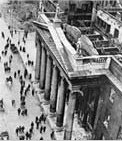Friday, May 05, 2006
Bobby Sands
Twenty-five years ago from right now we were in the last moments of Bobby Sands life, and everything was very tense all over Ireland. The first of the ten hunger strikers to die, Sands was a hugely popular figure among republican prisoners. Although there have been many articles, unlike the recent anniversary of the 1916 Rising, you will find no special supplement on The Irish Times website.
Where I lived in Dublin was decked in black flags during the 1981 Hunger Strikes, and following each death some students would come in wearing black armbands. My primary school's roof was covered in the biggest piece of political graffiti I have ever seen. Hundreds of feet long, the slogan in white paint was a simple "Smash H-Blocks". Where space didn't allow the longer slogan, the shorter "S H B" was used and it seemed to be on every wall within a mile or two of my home.
I was a teenager but a couple of my older friends made the journey north to Bobby Sands funeral, negotiating UDR checkpoints to be among the 100,000 in attendance. By then Sands had been elected to the British parliament and when I attended Ireland international soccer games chants of "Bobby Sands, MP" were common and would continue for at least two years. Mind you I would also hear chants of "Rambo was a Provo" and I've no idea what Ruud Gullit and the Dutch made of that.
I do recall that the atmosphere on the streets of Dublin's city center and suburbs was electric with a national dread in the air before the the first death, and continued over the six torturous months of the Hunger Strike. Demonstrations were constant, and very prominent in the city centre. A major riot occurred at the British Embassy.
In a debate that has echoes today around Guantanamo, many people staunchly against the republican organizations from which the prisoners came (IRA and INLA) were supportive of their protest despite what seemed like contradiction to others.
Perhaps it's very Irish, or human, or even Christian, but throughout the history of Ireland's political woes, similar contradictions have occurred. People would use the word 'hate' a lot. They hated bombs and they hated the British. Certainly the reaction of the British Thatcher government contributed to this among Nationalists in Ireland. The earlier prisoner protests of the 'blanket protest' and the 'dirty protest' had similar popular support.
It might be worth noting the contrast in approaches taken by that Conservative Party government in Britain, and the current White House administration, in how they both use the politics of words to fight what they have both declared to be terrorism. At the crux of the Hunger Strike was the recognition that prisoners wanted that they were political combatants involved in a war, and not the same as ordinary prisoners.
The British government recognized this until the mid-seventies and then withdrew political status and began a policy of criminalization. Similarly the British government would never acknowledge that the violence that was occuring daily in any way constituted a war, as that was seen as some sort of legitimizing.
By contrast the US administration has announced without qualification that it is engaged in a War (on Terror), and those who are attacking it are a special kind of prisoner. Ironically some American generals have suggested the name change to that of 'The Long War', perhaps unaware (or not caring) that Irish Republicans use the same term for the 1969-1994 years.
When Sands died his Westminster seat was up for re-election and was won by his election agent Owen Carron, as the British government had rushed through legislation to prevent more prisoners from standing for election. Before the Hunger Strike was over two prisoners would be elected to the Republic's parliament and many smaller electoral victories would take place.
Afer the demoralizing impact of the abandoned 1980 Hunger Strike, the 1981 strike encouraged and galvanized republicans to escalate its political approach, and arguably ultimately led to the Peace Process and a Ceasefire but not before things were to get much uglier than experienced before. People were right, on all sides, to worry what would happen next when a group of prisoners chose to make the ultimate sacrifice.
Then and now I felt a tremendous sadness at the loss of each life, and the huge and painful impact on the families - indeed it was the families that finally stopped the strikes. The memory of those ten dead men (and earlier lone Irish hunger strikers) is a very emotive subject still and not one likely to be much cleaner on its own 90th anniversary, let alone its 25th.
Times change but they don't always bring answers. Suicide now is used as a weapon around the globe on a scale unheard of when Irish prisoners were ending their own lives in this horrible slow manner. Yet memory of their deaths brings painful memories of other deaths to many people also. Such is loss; little is simple. There are now plenty of good books on the subject from which you can learn without dogmatically sticking to anybody else's agenda.
Thirteen years after Bobby Sands death, when the Provisional IRA ceasefire was announced, I remember walking by a graffiti-free wall in Dublin that night, and feeling elated. Even if I knew the killing and dying wasn't quite over.











0 Comments:
Post a Comment
<< Home